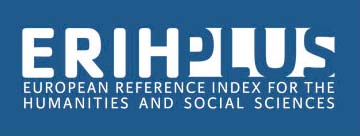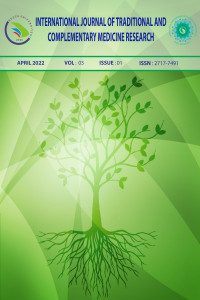Evaluation of the Knowledge, Attitudes and Behaviors of Midwives and Nurses with Regard to Traditional and Complementary Treatment Methods
Abstract
Objective: This research aims to determine the knowledge, attitudes, and behaviors of midwives and nurses with regard to traditional and complementary treatment methods.
Methods and Material: This descriptive, cross-sectional study was carried out between May and August 2021 with the participation of 248 midwives and nurses working in a District Health Directorate in the Mediterranean Region. A questionnaire about the knowledge and opinions of midwives and nurses with regard to traditional and complementary medicine (TCM), prepared by the researchers by reviewing the literature, and the Attitudes towards Holistic Complementary and Alternative Medicine Scale (AHCAMS) were used to collect the study data. Statistical analysis was performed using the Number Cruncher Statistical System (NCSS) 2007 [Kaysville, Utah, USA] software.
Results: The AHCAMS mean score of the midwives and nurses was determined as 26.86±7.46. The negative, level 0.209, weak correlation between the ages of the participants and their Complementary and Alternative Medicine (CAM) sub-dimension score was found to be statistically significant (p=0,001; p<0,01). The negative, level 0.145, weak correlation between the ages of the participants and their Holistic Health sub-dimension score was found to be statistically significant (p=0,022; p<0,05).
Conclusions: Although the midwives and nurses lacked knowledge about TCM methods, their attitudes were positive and they were willing to receive training.
References
- 1. Aktaş B. Hemşirelik öğrencilerinin bütüncül tamamlayıcı ve alternatif tıbba karşı tutumları. G.O.P. Taksim E.A.H. JAREN 2017; 3: 55-9.
- 2. Arslan M, Şahne BS, Şar S. Dünya’daki geleneksel tedavi sistemlerinden örnekler: Genel bir bakış. Lokman Hekim Dergisi 2016; 6:100-5.
- 3. Taştan K. Ülkemizde geleneksel tıbbın kilometre taşları. Ankara Med J 2018; 3:458-9.
- 4. Tokaç M. Geleneksel ve tamamlayıcı tıp uygulamaları mevzuatı hakkında. Hayat & Sağlık Sağlık ve Sosyal Bilimler Dergisi 2018; 17:22-5.
- 5. Oral B, Öztürk A, Balcı E, Sevinç N. Aile sağlığı merkezine başvuranların geleneksel /alternatif tıpla ilgili görüşleri ve kullanım durumu. TAF Prev Med Bull 2016;75-82.
- 6. Tütüncü S, Etiler N. Tıbbın Alternatifi Olmaz! Geleneksel Alternatif ve Tamamlayıcı Tıp Uygulamaları, Ankara Türk Tabipleri Birliği Yayınları 2017:9-53.
- 7. Cırık V, Efe E. Pediatri hemşireliğinde tamamlayıcı sağlık yaklaşımlarının önemi. Hemşirelikte Eğitim ve Araştırma Dergisi 2017; 14: 144-9.
- 8. Koçdağ M. Hekim Hemşire ve Hastaların Tamamlayıcı ve Alternatif Tedavi Konusunda Bilgi, Tutum ve Davranışları, Yüksek Lisans Tezi, Marmara Üniversitesi Sağlık Bilimleri Fakültesi Halk Sağlığı Ana Bilim Dalı, İstanbul, 2013. (Danışman: Doç. Dr. Yaşar Keskin)
- 9. Ovayolu Ö, Ovayolu N. Semptom yönetiminde kanıt temelli tamamlayıcı yöntemler. Erciyes Üniversitesi Sağlık Bilimleri Fakültesi Dergisi 2013; 1: 83-98.
- 10. Yetkin ÖF. Geleneksel ve tamamlayıcı tıp uygulamaları hakkında genel bir değerlendirme. Hayat & Sağlık Sağlık ve Sosyal Bilimler Dergisi 2018; 17:26-30.
- 11. Taşçı S, Developmen of integrative understanding in nursing education. İntegratif Tıp Dergisi 2015; 3:50-4.
- 12. Adigüzel H, Taşkin EO, Danacı AE. The symptomatology and prevalence of symptoms of premenstrual syndrome in Manisa, Turkey. Turk Psikiyatri Dergisi 2007; 18: 215-22.
- 13. Direkvand-Moghadam A, Sayehmiri K, Delpisheh A, Sattar K. Epidemiology of premenstrual syndrome (pms)-a systematic review and meta-analysis study. J Clin Diagn Res 2014; 8:106-9.
- 14. Lafçı D, Kaşıkçı KM. Knowing and using complementary and alternative treatment methods of health personnel working in inpatient health facility. Gümüşhane Üniversitesi Sağlık Bilimleri Dergisi 2014; 3:1-18.
- 15. Erci B. Attitudes towards holistic complementary and alternative medicine: a sample of healthy people in Turkey. J Clin Nurs 2007; 16: 761-8.
- 16. Öztürk H, Şaylıgil Ö. Geleneksel ve tamamlayıcı tıp uygulamaları yönetmeliğinin etik açıdan değerlendirilmesi. Turkiye Klinikleri J Med Ethics 2016; 24: 1-10.
- 17. Şahin ÇE. Tıbbın alternatifi mi? tıpta alternatif mi?. Hayat & Sağlık Sağlık ve Sosyal Bilimler Dergisi 2018; 17:18-21.
- 18. Kahraman A, Kırkan Ç. Investigation of Knowledge and Attitudes of Pediatric Nurses Toward Traditional and Complementary Medicine Practices. Journal of Traditional Medical Complementary Therapies 2020; 3:32-9.
- 19. Teke N, Özer Z, Bahçecioğlu Turan G. Analysis of Health Care Personnel's Attitudes Toward Complementary and Alternative Medicine and Life Satisfaction due to COVID-19 Pandemic. Holist Nurs Pract 2021; 35:98-107.
- 20. Demir E. Sağlık Çalışanlarının Geleneksel ve Tamamlayıcı Tedavi Yöntemlerine İlişkin Bilgi, Tutum ve Davranışları. İstanbul, Türkiye: Biruni Üniversitesi; 2019.
- 21. Özşaker E. The Knowledge and Attitudes of Nursing Senior Students Regarding Traditional and Complementary Medicine. Van Sağ Bil Derg. 2021; 14:153-62.
- 22. Bahall M, Legall G. Knowledge, attitudes, and practices among health care providers regarding complementary and alternative medicine in Trinidad and Tobago. BMC complementary and alternative medicine 2017; 17:1-9.
- 23. Christina J, Abigail W, Cuthbertson LA. Nurses’ knowledge and attitudes toward com- plementary therapies for cancer: a review of the literature. Asia Pac J Oncol Nurs 2016; 3:241-51.
- 24. Kocabaş D, Eke E, Demir M. Sağlık Hizmeti Kullanımında Bireylerin Geleneksel ve Alternatif Yöntemlere İlişkin Tutumlarının Değerlendirilmesi. BAİBÜ Sosyal Bilimler Enstirüsü Dergisi 2019; 19:63–80.
- 25. Lotfi MS, Adib-Hajbaghery M, Shahsavarloo ZR, Gandomani HS. The Prevalence of Traditional and Complementary Medicine in The General Population in Kashan, Iran, 2014. European Journal of Integrative Medicine 2016; 8:661–9.
- 26. Onyiapat EJ, Okoronkwo IL, Ogbonnaya PN. Complementary and Alternative Medicine Use Among Adults in Enugu, Nigeria. BMC Complementary and Alternative Medicine 2011; 11:7–12.
- 27. Cırık V, Efe E, Öncel S, Gözüm S. Experiences and attitudes of nurses regarding complementary health approaches used by themselves and their patients. J Transcult Nurs 2017; 28: 381-90.
Abstract
References
- 1. Aktaş B. Hemşirelik öğrencilerinin bütüncül tamamlayıcı ve alternatif tıbba karşı tutumları. G.O.P. Taksim E.A.H. JAREN 2017; 3: 55-9.
- 2. Arslan M, Şahne BS, Şar S. Dünya’daki geleneksel tedavi sistemlerinden örnekler: Genel bir bakış. Lokman Hekim Dergisi 2016; 6:100-5.
- 3. Taştan K. Ülkemizde geleneksel tıbbın kilometre taşları. Ankara Med J 2018; 3:458-9.
- 4. Tokaç M. Geleneksel ve tamamlayıcı tıp uygulamaları mevzuatı hakkında. Hayat & Sağlık Sağlık ve Sosyal Bilimler Dergisi 2018; 17:22-5.
- 5. Oral B, Öztürk A, Balcı E, Sevinç N. Aile sağlığı merkezine başvuranların geleneksel /alternatif tıpla ilgili görüşleri ve kullanım durumu. TAF Prev Med Bull 2016;75-82.
- 6. Tütüncü S, Etiler N. Tıbbın Alternatifi Olmaz! Geleneksel Alternatif ve Tamamlayıcı Tıp Uygulamaları, Ankara Türk Tabipleri Birliği Yayınları 2017:9-53.
- 7. Cırık V, Efe E. Pediatri hemşireliğinde tamamlayıcı sağlık yaklaşımlarının önemi. Hemşirelikte Eğitim ve Araştırma Dergisi 2017; 14: 144-9.
- 8. Koçdağ M. Hekim Hemşire ve Hastaların Tamamlayıcı ve Alternatif Tedavi Konusunda Bilgi, Tutum ve Davranışları, Yüksek Lisans Tezi, Marmara Üniversitesi Sağlık Bilimleri Fakültesi Halk Sağlığı Ana Bilim Dalı, İstanbul, 2013. (Danışman: Doç. Dr. Yaşar Keskin)
- 9. Ovayolu Ö, Ovayolu N. Semptom yönetiminde kanıt temelli tamamlayıcı yöntemler. Erciyes Üniversitesi Sağlık Bilimleri Fakültesi Dergisi 2013; 1: 83-98.
- 10. Yetkin ÖF. Geleneksel ve tamamlayıcı tıp uygulamaları hakkında genel bir değerlendirme. Hayat & Sağlık Sağlık ve Sosyal Bilimler Dergisi 2018; 17:26-30.
- 11. Taşçı S, Developmen of integrative understanding in nursing education. İntegratif Tıp Dergisi 2015; 3:50-4.
- 12. Adigüzel H, Taşkin EO, Danacı AE. The symptomatology and prevalence of symptoms of premenstrual syndrome in Manisa, Turkey. Turk Psikiyatri Dergisi 2007; 18: 215-22.
- 13. Direkvand-Moghadam A, Sayehmiri K, Delpisheh A, Sattar K. Epidemiology of premenstrual syndrome (pms)-a systematic review and meta-analysis study. J Clin Diagn Res 2014; 8:106-9.
- 14. Lafçı D, Kaşıkçı KM. Knowing and using complementary and alternative treatment methods of health personnel working in inpatient health facility. Gümüşhane Üniversitesi Sağlık Bilimleri Dergisi 2014; 3:1-18.
- 15. Erci B. Attitudes towards holistic complementary and alternative medicine: a sample of healthy people in Turkey. J Clin Nurs 2007; 16: 761-8.
- 16. Öztürk H, Şaylıgil Ö. Geleneksel ve tamamlayıcı tıp uygulamaları yönetmeliğinin etik açıdan değerlendirilmesi. Turkiye Klinikleri J Med Ethics 2016; 24: 1-10.
- 17. Şahin ÇE. Tıbbın alternatifi mi? tıpta alternatif mi?. Hayat & Sağlık Sağlık ve Sosyal Bilimler Dergisi 2018; 17:18-21.
- 18. Kahraman A, Kırkan Ç. Investigation of Knowledge and Attitudes of Pediatric Nurses Toward Traditional and Complementary Medicine Practices. Journal of Traditional Medical Complementary Therapies 2020; 3:32-9.
- 19. Teke N, Özer Z, Bahçecioğlu Turan G. Analysis of Health Care Personnel's Attitudes Toward Complementary and Alternative Medicine and Life Satisfaction due to COVID-19 Pandemic. Holist Nurs Pract 2021; 35:98-107.
- 20. Demir E. Sağlık Çalışanlarının Geleneksel ve Tamamlayıcı Tedavi Yöntemlerine İlişkin Bilgi, Tutum ve Davranışları. İstanbul, Türkiye: Biruni Üniversitesi; 2019.
- 21. Özşaker E. The Knowledge and Attitudes of Nursing Senior Students Regarding Traditional and Complementary Medicine. Van Sağ Bil Derg. 2021; 14:153-62.
- 22. Bahall M, Legall G. Knowledge, attitudes, and practices among health care providers regarding complementary and alternative medicine in Trinidad and Tobago. BMC complementary and alternative medicine 2017; 17:1-9.
- 23. Christina J, Abigail W, Cuthbertson LA. Nurses’ knowledge and attitudes toward com- plementary therapies for cancer: a review of the literature. Asia Pac J Oncol Nurs 2016; 3:241-51.
- 24. Kocabaş D, Eke E, Demir M. Sağlık Hizmeti Kullanımında Bireylerin Geleneksel ve Alternatif Yöntemlere İlişkin Tutumlarının Değerlendirilmesi. BAİBÜ Sosyal Bilimler Enstirüsü Dergisi 2019; 19:63–80.
- 25. Lotfi MS, Adib-Hajbaghery M, Shahsavarloo ZR, Gandomani HS. The Prevalence of Traditional and Complementary Medicine in The General Population in Kashan, Iran, 2014. European Journal of Integrative Medicine 2016; 8:661–9.
- 26. Onyiapat EJ, Okoronkwo IL, Ogbonnaya PN. Complementary and Alternative Medicine Use Among Adults in Enugu, Nigeria. BMC Complementary and Alternative Medicine 2011; 11:7–12.
- 27. Cırık V, Efe E, Öncel S, Gözüm S. Experiences and attitudes of nurses regarding complementary health approaches used by themselves and their patients. J Transcult Nurs 2017; 28: 381-90.
Details
| Primary Language | English |
|---|---|
| Subjects | Traditional, Complementary and Integrative Medicine |
| Journal Section | Research Article |
| Authors | |
| Publication Date | April 4, 2022 |
| Submission Date | November 18, 2021 |
| Published in Issue | Year 2022 Volume: 3 Issue: 1 |
Cited By
Doğum Sonu Dönemde Geleneksel ve Tamamlayıcı Tıp Yöntemleri ve Ebelik Bakımı
Sakarya Üniversitesi Holistik Sağlık Dergisi
https://doi.org/10.54803/sauhsd.1174745
IJTCMR
International Journal of Traditional and Complementary Medicine Research





